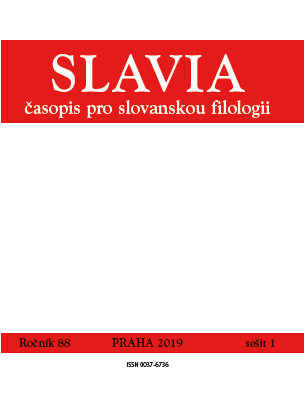Genderová dynamika v koncentračním táboře. Krabice živých od Norberta Frýda
Gender Dynamics in the Concentration Camp: Norbert Frýd’s A Box of Lives
Author(s): Dirk UffelmannSubject(s): Gender Studies, Czech Literature, History of the Holocaust
Published by: AV ČR - Akademie věd České republiky - Slovanský ústav and Euroslavica
Keywords: Norbert Frýd; A Box of Lives ; Nazi concentration camps; Holocaust Gender Studies; femininities and masculinities; gender shifts; Czech literature
Summary/Abstract: This article argues that the identifi cation of the forgotten Czech author Norbert Frýd with Socialist Realism is only partially appropriate. The plot of his most widely recognized text, the concentration camp novel Krabice živých (A Box of Lives, 1956), actually fails to substantiate the compulsory teleology of growing ideological awareness. Instead, the novel’s manifold characters engage in disparate renegotiations of the gender identities that they held outside the camp. Drawing on R. W. Connell’s Gender and Power (1987), it is argued that the narrator of the alleged Socialist-Realist concentration camp novel is more fascinated with gender shifts than with ideology. The former are depicted as caused by the interaction of diff erent patterns of femininities and masculinities in the camp. The most signifi cant element of reductionism which can be diagnosed in this intriguing disparateness of gender interactions and shifts in Frýd’s A Box of Lives is the fi xation on power relations (not so diff erent from that in Connell’s theory). In the case of one single female fi gure (the gracile Hungarian girl Jolán), Frýd’s narrator discards his own rule that everybody’s gender identity undergoes a renegotiation in the concentration camp. This exemption betrays a rather conventional sympathy for shy and innocent femininity. Consequently, the de-eroticized mutual responsibility that the main character, Zdeněk, and Jolán develop for each other is the only instance when Frýd’s unideological focus on unpredictable gender dynamics retires behind the “political (anti-)erotics” of Socialist Realism. This, however, does not preclude the author from concluding that Frýd’s A Box of Lives deserves a new reading from the point of view of literary anthropology and Holocaust Gender Studies – and maybe also a new critical edition of the novel.
Journal: Slavia - časopis pro slovanskou filologii
- Issue Year: LXXXVIII/2019
- Issue No: 1
- Page Range: 17-29
- Page Count: 13
- Language: Czech

